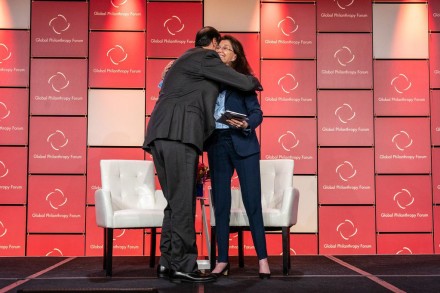As philanthropists start to discover the imperative of working more closely together as partners, they are coming up against their own culture of autonomous and often unilateral work in their own areas of special interest. The third day of GPF started out with a panel that advocated for learning while giving, taking advantage of domain expertise in what is becoming a rich knowledge marketplace that must be shared to increase impact. Phil Buchanan, president of The Center for Effective Philanthropy, pointed out the pitfalls of relying on comfortable business models when developing philanthropic approaches. In particular he warned against the overreliance on business strategy, scaling even when it’s not appropriate, and forcing non-profits into what he called “absurd metrics” that have more to do with the investors/donors than with the mission of the organizations. An interesting counterargument was offered by Chuck Harris, CEO of Blue Meridian Partners, who advocated for solid strategic business plans in order to attract both donors and impact investors still needing recommendations about how to allocate their resources. The issue of scale was also addressed by Cecilia Conrad, managing director of the John D. And Catherine T. MacArthur Foundation, and Charlotte Pera, president and CEO of the ClimateWorks Foundation. Both emphasized the need for the entire philanthropic community to discern the appropriate level of scale and business strategy in which to operate effectively.

GPF participants then had the opportunity to hear from a panel of Venezuelan activists who have direct experience of the violence and repression in their country and are responding to the crisis both inside and outside the country. They are working as human rights defenders, educators and family service providers, and are each making their contribution to the reclaiming of democracy.
We heard a lot during GPF that information in general, and data in particular, is not only a critical piece of the puzzle but needs to be shared in order to have an impact. During this session, the topic was further expanded to include transparency, not only of data but also of financial transactions and decision making. Patrick Alley, co-founder and director of Global Witness, emphasized the need for information on how money moves, who is moving it, and for what. Giannina Segnini, director of the Masters of Science Data Journalism Program at Columbia University Graduate School of Journalism, pointed out that information also needs to include context and culture. She explained that “anyone can start a church in this country, preach and organize around any issue they want and then influence global discourse and policy without scrutiny.” The ease of moving money across porous international borders was highlighted by John Githongo, CEO of Inuka Kenya Trust, and Chris Taggart, co-founder and CEO of OpenCorporates. Both pointed out how most people in the world, especially in poor countries, have no idea how their national leaders and corrupt business interests are manipulating funds and syphoning off millions of dollars for personal gain. All agreed that in such an environment of opacity and deception, transparency is critical to the preservation of democracy and trust. But then what? Esther Dyson, executive founder of Wellville, made an important distinction between “having transparency” and “having the courage to act upon the information gleaned from that transparency.”

The last session of the conference called upon philanthropists to take a stand and go that extra step. Peter Eigen, founder of Transparency International, gave us a framework within which to consider the next frontier of citizen agency. He posited that effective civil action is being held back by what he called the “shrinking space” and lack of safety in civic action. These risks were brought into very sharp focus by Ivo Herzog, chairman of the Vladimir Herzog Institute. Ivo is the son of the late Vladimir Herzog, a Brazilian journalist who was tortured and killed by the Brazilian government in 1975. With the power invested in philanthropic foundations and individuals around the world, Peter Eigen proposed a kind of “United Citizens” organization (loosely modelled after the United Nations), where civil society organizations and individuals can be guaranteed the funding, space and safety to do their most effective work to reclaim democracy.

The conference closed with remarks from Jonathan Visbal, chairman of the Board of Trustees of World Affairs, who not only thanked all participants for their work but also gave recognition to Jane Wales. Jane has led the World Affairs Council for 21 years and the Global Philanthropy Forum for the last 18 of those years, and will now be moving on to co-lead the Aspen Institute. She shared her joy about the willingness of the international community to engage in meaningful dialogue and build international networks, and gave her appreciation for the momentum that has been created by all involved. In speaking about the “end of an era” with GPF, Jonathan optimistically added that while “you can never replace a founder, you can build on the foundation.”

